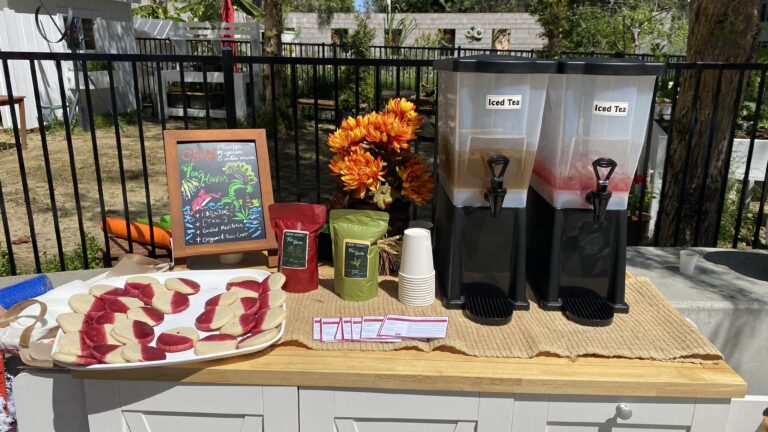
Amidst bustling sidewalks, buzzing classrooms and students’ full calendars of extracurriculars, a sanctuary and workshop beckons from the Sequoia Courtyard, within Sequoia Hall. Established in 2022 in the College of Health and Human Development, CSUN’s Tea Haven promotes stress management and supports mental health using creative arts modalities.
This program, open to CSUN students, emphasizes the art of healing and wellness through the consumption of hot and iced herbal and regular tea blends. The wide variety of flavors offered at workshops includes rosa de Jamaica, vanilla chai, peppermint and “Matador Passion,” accompanied by creative, engaging workshops. Students of the Marilyn Magaram Center for Food Science, Nutrition, and Dietetics grow and process all of the teas right in the Sequoia Courtyard’s Wellness Garden. Then students conduct sensory testing of each blend in the food science laboratory. Then, it gets sent to a local packaging company to seal their newly crafted brew.

The monthly workshops incorporate elements of music therapy, immersive art, interior design, tea education, sustainability and tools for better mental health practices. Workshops are conceptualized and facilitated by students from majors in food science, nutrition and dietetics as well as psychology, child and adolescent development, art, music, and interior design, who work on the layout.. Child and adolescent development professor Nancy Miodrag and Annette Besnilian, Marilyn Magaram Center executive director and CSUN alumna, launched the Tea Haven as a balm for stressed-out students.
“As students were coming back from the pandemic, [Miodrag] proposed for us to work together to provide a safe place where they could gather, destress, sip on teas and experience music and art therapy,” Besnilian said. Miodrag has been a long-time proponent of mindfulness meditation practices and was confident that bringing together mindfulness, the creative arts and the ritual of tea consumption, would be a truly healing combination for our campus.
They took it a step further to incorporate hands-on learning, collaborating with graduate students researching food science.
“It gives an opportunity for our students and faculty from across disciplines to work together, and each of them brings their own expertise,” Besnilian said.
Homegrown teas aren’t new to the Magaram Center, where student interns from different departments such as food science, nutrition, dietetics and the Wellness Garden have been growing and producing teas since 2016, when the garden debuted. A Campus Quality Fee Grant for the 2022-23 school year helped launch the workshops, opening them up to the entire CSUN community. Beyond tea, the students curate and test a variety of campus-grown products, including “Spicy Matador” seasoning, hot sauces, orange marmalade made from Valencia oranges in CSUN’s Orange Grove, “Bee a Matador” honey, protein bars — even a wellness cookbook. Most are sold on their website and the CSUN bookstore.
Attending the Tea Haven workshops allows college students – from Freshmen to graduate students to participate in mindfulness activities that promote mental health, reduce stress, recharge, and increase productivity and hopefulness during times of distress, Besnilian said.
“[My favorite part is] being able to see a lot of us come together from different parts of campus for the health and wellness of our community,” she said. “It makes me very proud as a Matador.” For upcoming Tea Haven workshops in fall 2024 and to learn more, visit the Marilyn Magaram Center’s Instagram and events page on their website.




Comments are closed.